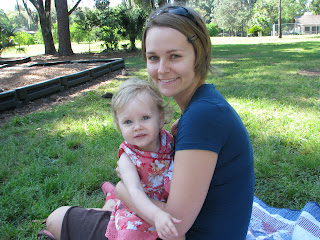.JPG) |
| hand washing, hand rinsing, line drying diapers while camping |
All of those are true. But, they have surpassed their intended purpose, and have instead created more work.
Think about it: computers are so ubiquitous that you are supposed to have access to one at all times; you should be able to, and are often expected to, check your work email on your weekends and proofread proposals and memos on your vacation. You are expected to bring your work home with you. I thought that the amazing thing about work vs school would be that there is no homework! Even for us stay at home moms, we need to be "current" on Facebook, and know what the greatest holiday crafts on Pinterest are.
Cell phones certainly are used for emergencies--thank goodness, as almost all of the pay phones have disappeared! But now, we keep our cell phones on all the time. On us. We take them to dinner, to the movies, to church, to the playground with our children. And not for emergencies...for entertainment and conversation through the digital interface, instead of face to face with real people.
Now that we all have our own washers and dryers, we have more clothes. We spot clean our clothes less. We are less likely to have, as adults, work/play clothes, and "regular" clothes. Fewer women wear aprons in the kitchen; fewer men wear coveralls in their home wood shops. Because it is so "convenient" to clean our clothes, we don't worry about getting our clothes dirty. Granted, this is also because clothes are so cheap, so they are easy to replace if they get stained or ripped.
A long time ago, people only had rugs. "Carpets" did not really exist. Rugs could be swept, but to be truly cleaned, they had to be taken outside and worked on for hours. So that was only done a few times a year. With the vacuum cleaners, it is much easier to keep rugs clean. But because of this, we now have more rugs to keep clean. And we are expected to keep them cleaner--after all, we have the modern convenience of vacuum cleaners.
Cars...don't get me started. Do I own a car? Yes. Am I glad I do? Yes!!!! But because of cars, and because of how the American system of living and working is built on the automobile, we live far from our friends, and far from our work. Many people live 10 or more miles from a grocery store or gas station! Cars are supposed to make us more sociable, and help us to get around. Instead, they have lengthened the distances between our friends and our families, and allowed us to live further from where we actually need to be. Which means, of course, that we spend more time driving, and we don't end up getting anywhere much more quickly than when we lived in town with our friends.
All of those inventions and pieces of technology are wonderful things--or they can be, if you place limits on them. I hope that we are not too involved with our technology and modern conveniences to stop and ask, "Who is serving whom?"
















.JPG)

.JPG)















